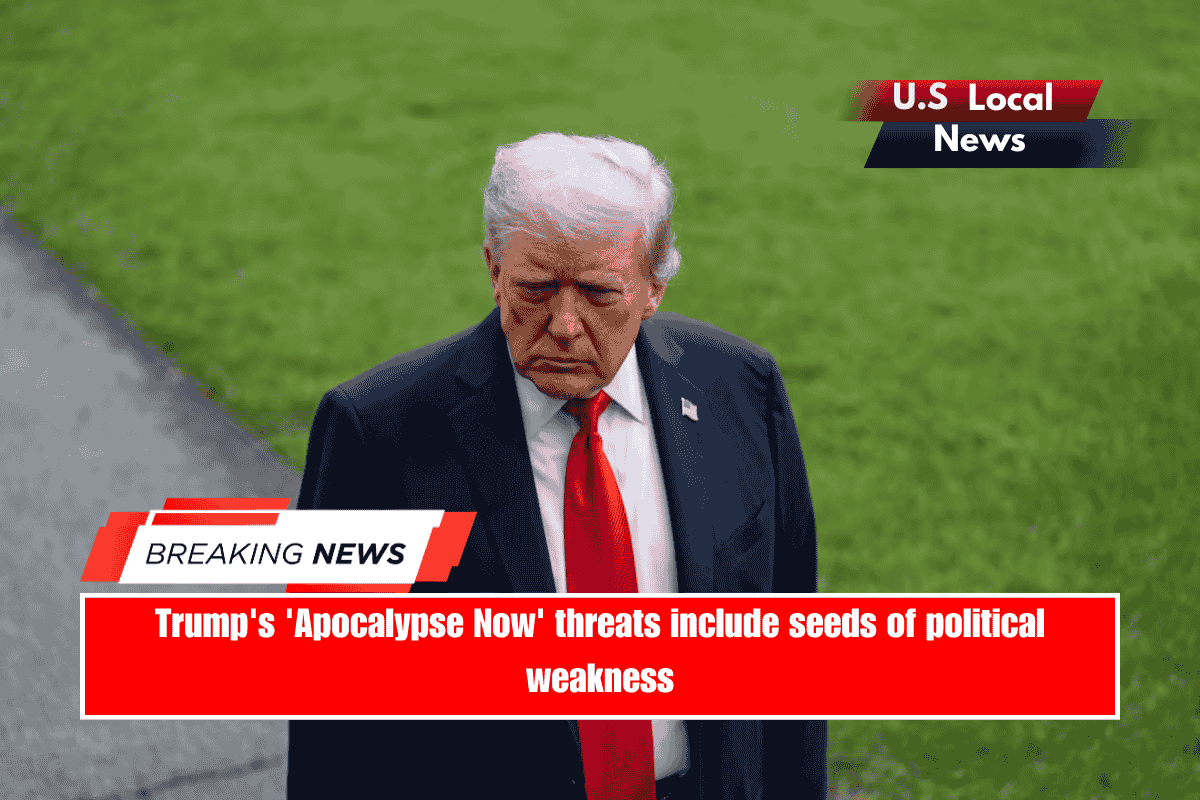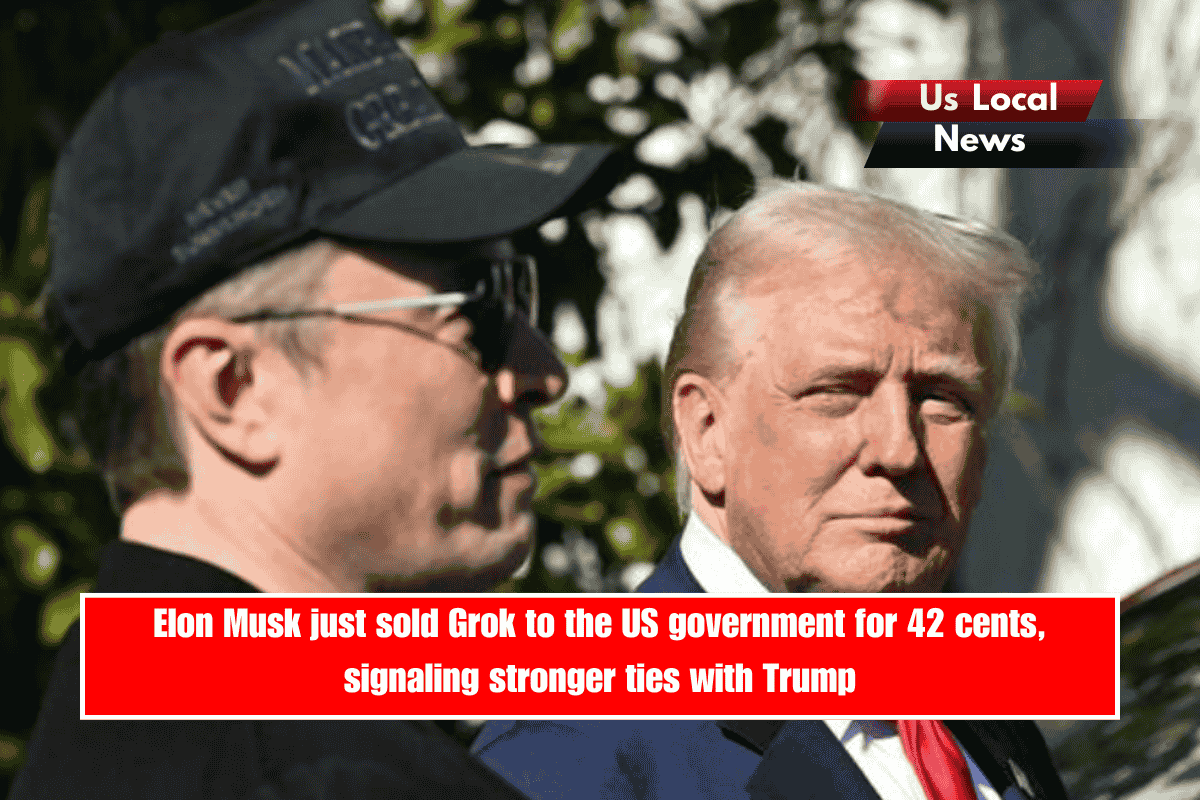President Donald Trump has vowed to wield apocalyptic power within the United States, even as the negative consequences of some of his key policies become clear.
His weekend share of a social media meme in which he threatened to wage war on Chicago, the next Democratic city to be targeted in his crime and immigration crackdown, was a classic Trumpian strategy. It portrayed him as a strongman unafraid to use force, inciting liberal outrage to appease his base. It was also tinged with menace and implied lawlessness, reflecting his view of the presidency as a tool for personal power rather than a constitutionally limited national trust.
Still, beneath Trump’s hyperbole, there are signs that his second administration, now eight months old, is entering a new phase. His frenetic pace and thunderclap tests of the Constitution have so far had a disorienting effect. The courts struggled to keep up. Democrats flailed, mourning their election loss while attempting to figure out the fundamental task of learning to communicate with Americans.
However, Trump’s policies, particularly in the areas of the economy, public health, and foreign policy, are having consequences that could lead to political backlash. Democratic opposition is growing among governors such as California’s Gavin Newsom and Illinois’ JB Pritzker, both of whom are looking for a fight to advance their own political careers. The president had a terrible time in court last week, and his policy priorities were temporarily disrupted. A landmark Supreme Court decision on Trump’s tariff policy is pending, and Treasury Secretary Scott Bessent said Sunday on NBC’s “Meet the Press” that losing would be “terrible” because Trump would have to cut refund checks for half of tariff revenue.
The White House’s response to mounting challenges is to escalate disruption and executive power grabs. That’s the only way Trump knows. Its new front against drug cartels in the Caribbean reinforces this point. Last week, US forces blew up a speedboat off Venezuela, allegedly carrying drug traffickers. Officials responded to questions about the potential illegal use of force and the destruction of due process with machismo. “We have the absolute and complete authority to conduct that,” Defense Secretary Pete Hegseth stated, failing to explain why.
The administration’s claim that the boat was operated by the Tren de Aragua gang could be true. However, presidents do not have the constitutional authority to wage war without first informing Congress or the public. After a Trump critic described the killings as a war crime, Vice President JD Vance stepped up the populist defiance, saying he didn’t “give a sh*t” about it. Kentucky Republican Sen. Rand Paul called it a “despicable and thoughtless sentiment … to glorify killing someone without a trial.”
Pundits frequently warn that events in Venezuela are “distractions” from Trump’s other vulnerabilities. However, the distractions eventually pose a greater threat to the Constitution than the original escapades. When is a distraction simply a diversion from another distraction?
Challenging political months may lie ahead
Putting aside inflammatory X posts and military bombast — Trump now wants Hegseth to be dubbed “secretary of war” — there is mounting evidence that the administration is treading dangerous political waters.
Trump’s economy, particularly the pre-Covid first-term version, which provided a brief window of voter security, contributed to his victory in last year’s election. However, the Trump economy 2.0, now fully exposed to his idiosyncratic theories on trade and government intervention, is mired in uncertainty. Friday’s jobs report was dire, and not just because only 22,000 jobs were created in August. It reported negative job growth in June, unemployment at 4.3%, the highest level since 2021, and the impact of Trump’s tariffs and immigration crackdowns on hiring.
Most of the measures in the report showed that the Biden economy was stronger than Trump’s. The manufacturing sector has taken a particularly hard hit, which is ironic given that the president’s trade wars are intended to revive a 1950s-style utopia of factories running at full capacity.
For those Americans who buy dinner at grocery stores and will not frequent Trump’s new White House “Rose Garden Club,” his claims that prices are falling are absurd. If this disconnect worsens, the administration’s spin could have a similar impact as the false trope that inflation was temporary, which sank President Joe Biden’s reelection bid.
Meanwhile, Health and Human Services Secretary Robert F. Kennedy Jr.’s pyrotechnic display in a Senate hearing last week foreshadows widespread public health disruption. It called into question whether Trump’s election victory last year was truly a message from voters that they want to undo all of vaccine progress and risk new epidemics this winter.
In foreign policy, the humiliating failure of Trump’s summit with Russian President Vladimir Putin was highlighted by this weekend’s ferocious air assault on Kyiv, the war’s largest yet. How much more carnage must occur before Trump is the last person in the world to realize his Russian ally does not want peace?
The president told reporters Sunday that he was prepared to impose tougher sanctions on Russia. But he has made threats before. Trump also wondered last week if India was “lost” to the US after his tariffs drove a country that US presidents had been courting for 30 years into the arms of China.
Last week also proved to be a setback for the administration in court. A judge ruled that Trump’s deployment of the federalized National Guard to California in June “willfully” broke the law. The ruling coincided with a massive military parade in China, demonstrating President Xi Jinping’s immense domestic power. It was a reminder that a US strongman is still subject to more constitutional constraints than genuine tyrants.
Another US judge ruled that using the Alien Enemies Act to deport Venezuelan gang members is illegal, prohibiting its use in several Southern states. One federal judge ruled that Trump illegally blocked $2 billion in funding for the Ivy League school. Another blocked Trump’s termination of temporary status, which granted more than a million Haitians and Venezuelans the right to live in the United States.
Why Trump fans don’t think his administration is in trouble
The administration does not have much time for district court decisions, arguing, sometimes rationally, that it will fare better in more conservative appeals courts and a Supreme Court with a broad interpretation of executive power.
Supporters have different perspectives on the political environment.
Trump has been abusing executive power, defying courts, and attacking public health, military, legal, educational, and media institutions since taking office. Many MAGA supporters see this as the ultimate goal. His enthusiasm for battles is a selling point, as noted by Florida’s surgeon general, Dr. Joseph Ladapo, on “State of the Union” Sunday. “I have enormous respect for who he is. Many people have tried to make his life extremely difficult. “And he’s emerged as a terrific leader and symbol for many, many Americans,” Ladapo told CNN’s Jake Tapper.
Still, Trump appears unconvinced by Ladapo’s attempt to repeal Florida’s school vaccine mandate. “You have vaccines that simply work. “They’re not controversial at all, and I believe those vaccines should be used,” he said Friday.
Hegseth, a former Fox News anchor, is among cabinet officials who understand the base.
Tough talk, including forcing liberals to argue that alleged drug traffickers were victims of war crimes, can be effective politics. Sending National Guard troops into Democratic cities like Los Angeles, Chicago, and Washington, DC, which have tolerated high rates of crime and homelessness, is also an option.
“Thank God President Trump called in the National Guard to bring peace,” Trump’s border czar, Tom Homan, said on “State of the Union,” praising reservists for lowering crime rates. His comment emphasized the political equation at hand. In the abstract, it may be concerning that soldiers are on city streets and appear unoccupied, with some reduced to picking up trash during a $1-million-a-day deployment. But won’t voters grow accustomed to their presence and perceive it as reassuring? Can you put a value on lives saved in inner cities?
Trump has another advantage: supine Republicans on Capitol Hill are unlikely to do anything to check him, despite the fact that his actions in Venezuela and trade wars usurp congressional power.
And if all else fails, the White House will simply declare victory. Trump’s claims to have ended seven wars may be exaggerated, and his trade deals lack specifics — but they sound promising.
Low polling numbers haunt Trump again
New polls released Sunday showed Trump’s approval rating in the low to mid-40s. The most recent CNN Poll of Polls has him at 43%. With a midterm election just over a year away, Republicans have historically faced threats in this territory. But Trump has almost always polled at such low levels during his White House tenure, when he has made little effort to govern for all Americans, so the West Wing may not be concerned. However, this is a bad place to start if the economy deteriorates this year.
And that is the key question. Will Trump’s seemingly impregnable support from a base that has always sustained him crack if the economy falters? How long will his promise of a golden age last if inflation strikes, unemployment rises, and economic gloom engulfs the country?
In the short term, Friday’s jobs report may provide some political relief by prompting the Federal Reserve to lower interest rates more than expected. However, Trump’s attempt to undermine the central bank’s independence is a long-term issue. He could send prices soaring if he orchestrates massive rate cuts next year, following the end of the term of Fed Chairman Jerome Powell, whom he refers to as “Too Late” Powell.
The impending peril can be detected in Trump’s subordinates’ scattershot response to the jobs report. Bessent told NBC that August was the “noisiest” month of the year statistically. National Economic Council Director Kevin Hassett stated on CBS’ “Face the Nation” that the issue was “dissonance in data.” On CNBC, wealthy Commerce Secretary Howard Lutnick predicted that great job numbers would be “starting six months to a year from today.” That is no consolation to a working American who has recently lost their job as a result of Trump’s economic policies.
None of these officials addressed the central issue: the economic impact of one man’s idiosyncratic trade policies, which most experts believe are based on fantasy.
Perhaps the economy, which has proven extremely resilient, will save Trump. If not, Americans will see if he can truly defy political gravity. At that point, a meme of Bill Kilgore, the amoral but guilt-free protagonist of “Apocalypse Now,” would be of little use.









